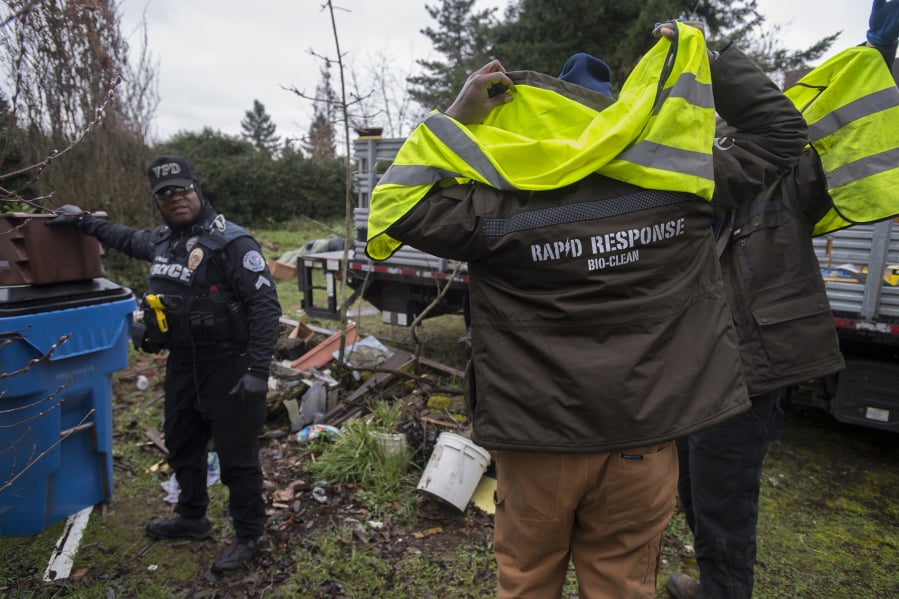At the end of an alleyway in Vancouver’s Arnada neighborhood were remnants of a campsite: cans, sleeping bags, clothes, a chair, a cooler and a carton of smashed eggs, all ruined by the rain.
Neighborhood Police Officer Tyler Chavers had posted a cleanup notice at the campsite on Tuesday after getting complaints from a 91-year-old woman who lives in a home next to the camp. None of the campers were still there Friday morning. Tammi Neblock, a code enforcement officer with the city of Vancouver, said it all would be hauled to Waste Connections.
“Once something like this is here, it attracts people to dump stuff, so it’s best to clean it up,” she said.
It was a smaller camp compared to what the city normally addresses, but it had apparently been there a while; rugs were moss-covered and buckets were filled with dirt and grass.
City employees primarily stood off to the side Friday morning as three employees from Portland-based Rapid Response Bio Clean got to work. They backed up a truck through the narrow alleyway and began tossing items into the trailer.
The city hasn’t always solicited outside help to clean up homeless camps. Since the city legalized camping between 9:30 p.m. and 6:30 a.m. in November 2015, the task of cleaning up camping-related refuse was primarily done in-house.
“We had some growing pains early on,” Operations Superintendent Brian Potter said in an interview with The Columbian.
As homelessness grew, so did the city’s workload.
Growing need
The 2018 Point in Time count, a census of the homeless population, found a 39 percent increase in the number of people living outside compared with 2017. And, 2017 was an increase of 18 percent from 2016.
Results from this year’s Point in Time, which was done Jan. 23, have not been released. However, outreach workers and homeless advocates have said the count may be inaccurate and more of an undercount than normal because the city cleaned up camps the same morning as the count, disrupting their efforts to survey people living outside.
“It undermines the relationship with have built with people outside,” Jamie Spinelli, a case manager with Community Services Northwest, said at the city’s monthly Homeless Ideas Group meeting.
Potter said the city is fine-tuning its approach to cleaning up homeless camps and is “looking at how we do this as best we can.” At first, the city began focusing weekly on the area around Share House, the men’s homeless shelter downtown. Cleanups typically involve police, code enforcement and public works, and can take a handful of hours.
“We started being pulled from our typical work,” Potter said.
His department deals with striping and paving roads, mowing and cleaning. If the city is out paving, it’s difficult to drop that task to go clean up a camp. The city began looking at contractors for camp cleanups — not to outsource the work completely but to use them as a tool, Potter said.
The “worst of the worst” situations are contracted out, he said. Due to increased enforcement of the camping ordinances, the camps around Share House have mostly dispersed and there are now smaller camps in other areas and city parks.
Potter said Vancouver looked at how Bellingham, Seattle, King County, Olympia, Tacoma, Portland and Gresham, Ore., deal with cleaning up camps and the sort of contracts they hold with cleanup companies.
Rapid Response
The city began soliciting transient camp and abatement services July 19. Rapid Response Bio Clean was one of three applicants.
Rapid Response, which employs 25 people, specializes in anything involving a biohazard, from suicides to homicides to homeless camps. Since starting in 2015, cleaning up homeless camps has become a bigger part of the company’s work, owner Lance Hamel said.
The company primarily cleans up camps in the Oregon cities of Gresham, Beaverton and Portland. Its $350,000 contract with Portland for campsite cleanup began Sept. 1, 2016. There, the company is responsible for coordinating cleanups and taking photos of camps and personal property. Portland pays $59 per hour for their labor, according to the contract.
“We try to service everybody the best we can,” Hamel said. “Every city does things a little differently.”
But, the situations are much the same: There are people who are horribly disadvantaged and living in a horrible situation, and there are also homeowners living next door to these camps, he said.
“It’s a pretty big problem, and there are a lot of ways to deal with it,” Hamel said. “People are trying to come up with a concept that’s fair to everyone.”
$89 an hour
Rapid Response’s contract was approved in October for $300,000 and didn’t have to go through Vancouver City Council approval. (By comparison, the council recently approved the $1,076,928.57 contract for Waterfront Park groundskeeping to Brightview Landscapes LLC, and $500,000 in high-speed digital printing services from Lasko Printing Inc.) A second $300,000 contract was approved for Bio Management Northwest, but the company wasn’t as responsive as the city needed them to be, Potter said.
Potter doesn’t think the city will spend the full $300,000 this year. He added that the city may call upon Rapid Response in the event of a traffic collision that results in a biohazard, or if there’s blood in a park restroom.
Rapid Response helped for the first time with a Nov. 21 cleanup. Between Nov. 21 and Dec. 13, the city spent $12,057.99 on contracted transient camp abatement services.
According to emails obtained by The Columbian through a public records request, police described Rapid Response as quick, eager to help, prepared and receptive to feedback.
Under the contract, Rapid Response’s workers are paid $89 hourly by the city. Overtime pay is $133.50 per hour. The city also reimburses the company for supplemental equipment such as pressure washers, backhoes and sharps or biohazard disposal containers.
Potter said in a Nov. 28 email to Cpl. Rey Reynolds, who’s with Vancouver Police Department’s bicycle officer unit, that adding a contractor to the mix seemed to be working out.
“I’m sure you have no idea of the years we (VPD, Code, and Public Works) have been trying to fine-tune our encampment cleanup communication and processes. It’s been a bit of a bumpy road at times, working through the personalities, individual processes and some of the legal sensitivities we are operating under,” he wrote.
The city’s next step is updating the camping enforcement procedures, which were last revised Dec. 17, 2015. According to the document, the usual process is to first contact the camp and advise people that they’re violating the city’s camping and storage ordinances, then police return to the campsite later and cite people for camping if they’re still there. The property is photographed and tagged for disposal or storage and later removed.
Complaints made by people calling 311 or 911 inform which camps the city addresses.




